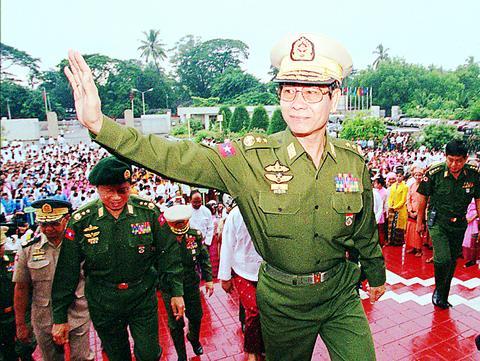Myanmar's state radio and television announced yesterday that Prime Minister General Khin Nyunt has been replaced by a hardline member of the country's ruling military junta, Lieutenant General Soe Win.
The brief announcement said Khin Nyunt was "permitted to retire for health reasons," a euphemism used in the past for the forced ouster of Cabinet members.

PHOTO: AP
The radio said Soe Win would become the new prime minister, moving from his high-ranking post of secretary-1 of the junta, which is officially called the State Peace and Development Council.
Both announcements were signed by the junta's supreme leader, Senior General Than Shwe.
Khin Nyunt, also head of military intelligence, had a reputation as a relative moderate compared to the more hardline generals who were his seniors.
Soe Win, 56, is believed to espouse a hard line in dealing with the country's pro-democracy movement, led by detained Nobel Peace Prize laureate Aung San Suu Kyi, and the country's foreign critics who want the army to hand over power to an elected government.
Soe Win is a former military commander of Myanmar's Sagaing region in the northwest who became air defense chief in November 2001.
He joined the junta as secretary-2 in February 2003, and was promoted to secretary-1 in an August 2003 Cabinet shake-up, replacing Khin Nyunt, who became prime minister.
Khin Nyunt's move to the prime minister's post last year was interpreted by some as a gesture toward reconciliation with the pro-democracy movement, while other analysts thought Soe Win's promotion was more significant.
He is believed by some diplomats and government critics to have been involved in a May 2003 attack on Suu Kyi and her followers in northern Myanmar by a mob of government supporters. Suu Kyi has been detained since the attack.
Yesterday's announcement said Soe Win would be succeeded as secretary-1 by Lieutenant General Thein Sein, moving up a step in the junta's hierarchy.
No announcement was made of who would replace Khin Nyunt in the influential post of military intelligence chief.

AGING: As of last month, people aged 65 or older accounted for 20.06 percent of the total population and the number of couples who got married fell by 18,685 from 2024 Taiwan has surpassed South Korea as the country least willing to have children, with an annual crude birthrate of 4.62 per 1,000 people, Ministry of the Interior data showed yesterday. The nation was previously ranked the second-lowest country in terms of total fertility rate, or the average number of children a woman has in her lifetime. However, South Korea’s fertility rate began to recover from 2023, with total fertility rate rising from 0.72 and estimated to reach 0.82 to 0.85 by last year, and the crude birthrate projected at 6.7 per 1,000 people. Japan’s crude birthrate was projected to fall below six,

Conflict with Taiwan could leave China with “massive economic disruption, catastrophic military losses, significant social unrest, and devastating sanctions,” a US think tank said in a report released on Monday. The German Marshall Fund released a report titled If China Attacks Taiwan: The Consequences for China of “Minor Conflict” and “Major War” Scenarios. The report details the “massive” economic, military, social and international costs to China in the event of a minor conflict or major war with Taiwan, estimating that the Chinese People’s Liberation Army (PLA) could sustain losses of more than half of its active-duty ground forces, including 100,000 troops. Understanding Chinese

US President Donald Trump in an interview with the New York Times published on Thursday said that “it’s up to” Chinese President Xi Jinping (習近平) what China does on Taiwan, but that he would be “very unhappy” with a change in the “status quo.” “He [Xi] considers it to be a part of China, and that’s up to him what he’s going to be doing, but I’ve expressed to him that I would be very unhappy if he did that, and I don’t think he’ll do that. I hope he doesn’t do that,” Trump said. Trump made the comments in the context

SELF-DEFENSE: Tokyo has accelerated its spending goal and its defense minister said the nation needs to discuss whether it should develop nuclear-powered submarines China is ramping up objections to what it sees as Japan’s desire to acquire nuclear weapons, despite Tokyo’s longstanding renunciation of such arms, deepening another fissure in the two neighbors’ increasingly tense ties. In what appears to be a concerted effort, China’s foreign and defense ministries issued statements on Thursday condemning alleged remilitarism efforts by Tokyo. The remarks came as two of the country’s top think tanks jointly issued a 29-page report framing actions by “right-wing forces” in Japan as posing a “serious threat” to world peace. While that report did not define “right-wing forces,” the Chinese Ministry of Foreign Affairs was